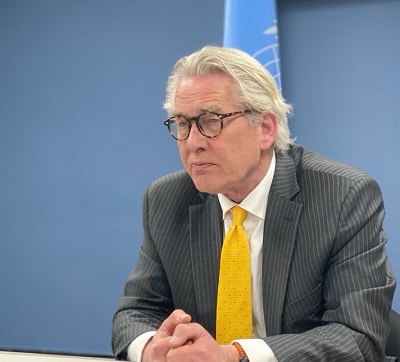United Nations, (Asian independent) UN Special Coordinator for the Middle East Peace Process, Tor Wennesland, has warned of the danger of an expansion of the ongoing Israeli-Palestinian conflict.
“I fear that we are at the brink of a deep and dangerous abyss that could change the trajectory of the Israeli-Palestinian conflict, if not of the Middle East as a whole,” he told an emergency meeting of the Security Council on Wednesday.
“After more than a century of conflict and over half a century of occupation, we, the international community, have failed collectively to bring the parties to a just, sustainable political resolution. The long-standing fissures run deep and extend well beyond the confines of Israel and the occupied Palestinian territory,” he said.
“The risk of an expansion of this conflict is real, very very real, and extremely dangerous.”
Today’s situation is one of the most difficult moments facing the Israeli and Palestinian people in the past 75 years, and poses a devastating and clearly difficult challenge for the region and for the international community. It comes at a moment when the global institutions that are needed to respond to such a crisis are already overstretched, he added via a video link from Doha, Qatar.
Wennesland stressed the importance of a long-term solution to the Palestinian question, Xinhua news agency reported.
“We must not let the dynamic of the current conflict take our eyes off what I would call the day after — the day after we need to start working on now.”
First, there should be the time and space to achieve two urgent objectives: Hamas’ immediate, unconditional release of all hostages; and rapid, unrestricted access of humanitarian aid for Palestinians in Gaza. The third step must be collective efforts to end the hostilities and prevent any further expansion of the conflict in the region, he said.
There should be no miscalculation, no provocation and no retrogress in the West Bank and Lebanon, he added.
The step beyond must be down the path toward a political horizon. Ultimately, the only way to bring an end to the bloodletting and prevent any recurrence is to pave a way toward a long-term political solution, in line with UN resolutions, international law and previous agreements, Wennesland said.
“A patchwork of ad-hoc and temporary fixes, and perpetual management of conflict without addressing underlying issues is not sustainable. That has been proven in the last 11 days. What we are seeing on the ground now, all too tragically proves this to be true. What we must do now is work together as one to achieve these objectives,” he added.








